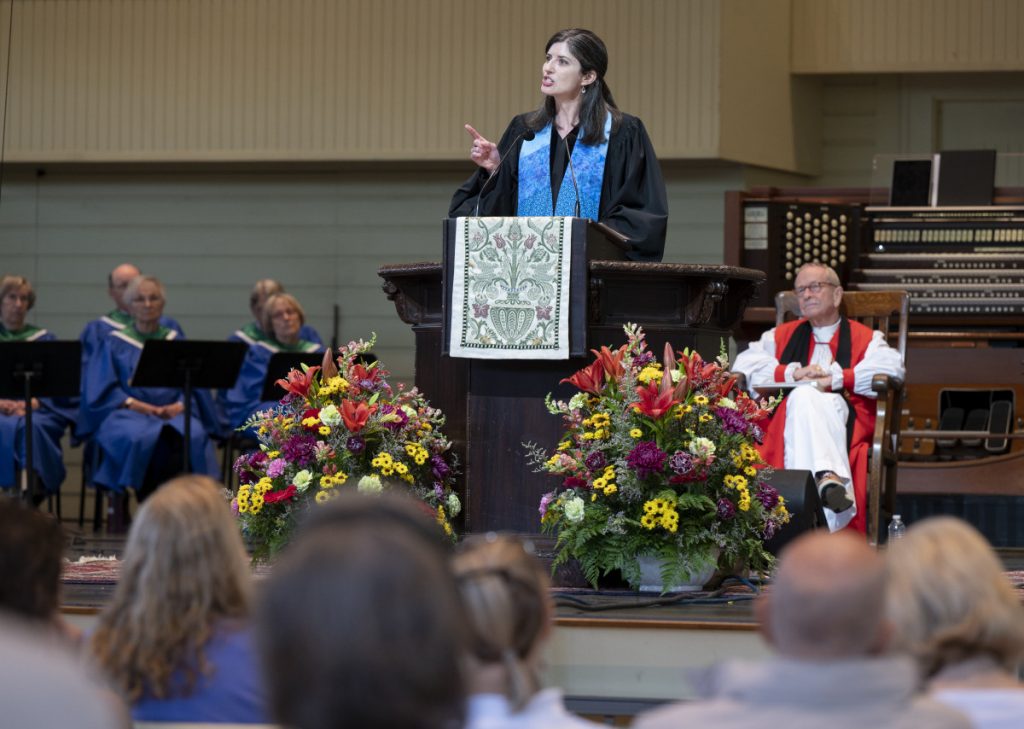MARY LEE TALBOT – STAFF WRITER

“After many weeks at home during the pandemic — like you, I suspect — I finally got around to doing some delayed tasks,” said the Rev. Lynn Casteel Harper. “I read my church’s bylaws from end to end.” Harper preached at the 9 a.m. Thursday morning worship service in the Amphitheater. Her sermon title was “Making the Most of Time,” and the Scripture reading was Ephesians 5:15-20.
The bylaws, she said, contain dry procedural language, “a remedy for insomnia. They include items like maintenance of membership rolls, revenue controls and building maintenance. Buried on Page 19 of 26 was a ‘Committee of Elders,’ designed to resolve disputes among members and provide counsel to church leaders. They are to be wise people who give advice and spiritual counsel.”
This practice had fallen by the wayside in the church, but Harper would like to revive it.
“It sounds like a wise idea, to put wisdom and wise ones at the center of our activity,” she said.
Paul, in writing to the Ephesians, urged them to live as wise ones as part of his larger emphasis on maturing in faith. In Ephesians 4: 14-15, Paul wrote, “We must no longer be children … but speaking the truth in love, we must grow up in every way into him who is the head, into Christ.”
“To live as wise, discerning people is essential to the life of faith,” Harper said. “The writer of Ephesians urged them to make the most of their time, to live in right relationship, to live intentionally in relationship with Christ.”
She told the congregation, “So often we talk about killing time or wasting time as if time is the enemy rather than a friend. We have a ‘to do list’ and a ‘bucket list’ and on the internet is a carefully curated YOLO list.”
She continued, “YOLO: You Only Live Once. These are people who are risk takers, who throw caution to the winds because — YOLO. This means cliff-face camping, volcano surfing and swimming with crocodiles in a cage of death. You know — YOLO.”
This self-indulgent attitude is not what Paul recommended, she said. There was less focus on the self and on adrenaline highs.
“The risk Paul wrote about was a life committed to faith, that the last shall be first, to the least of these, to understand the Lord’s will,” Harper said.
Scottish theologian John Swinton, whom Harper called the theologian of dementia, Alzheimer’s disease and cognitive disability, writes about time in light of faith, what he calls timefulness. Time is a gift from God for us to give to each other, Harper told the congregation, and through Jesus to give time to those in need.
Timefulness is an unrushed, attentive presence. “Timefulness honors being, not doing,” Harper said. “It honors the worth of self and others that is given, not earned.”
Harper asked the congregation, “Have you ever been sick or in a crisis and what you needed was people who offered timefulness, presence, not flowers or casseroles? These are people who will be there with you and for you. It is the greatest gift you can offer.”
A daughter, visiting her dying mother, told Harper that they sat together in “companionable silence.”
“Timefulness is about quality, not quantity,” Harper said. “Isn’t five minutes of being fully present worth more than 50 distracted minutes?”
During the pandemic, people found many ways to be present: Zoom, Facetime, phone calls, letters. The time of 625,000 vulnerable people was cut short, Harper said. “Clearly, we see the preciousness of time, and we need to reclaim time as a gift to use wisely and share with others.”
Harper turned to the members of the Motet Choir and told the congregation, “Singing is part of living wisely. To offer a song has nothing to do with productivity, it nourishes the soul; it is a sermon in song.”
She continued, “As long as we have breath, we can offer timefulness, God with us, Emmanuel. This is the holy presence in time that has nothing to do with things. We are called to a greater risk as we attempt to live as wise people with God’s help. And with God’s help, we can reclaim the holy gift of time.”
The Rev. Mary Lee Talbot presided. Bill Schweinfurth, president of the Lutheran Association of Chautauqua, read the Scripture. For the prelude, members of the Motet Consort, Barbara Hois, flute and Joseph Musser, piano, played “Largo e dolce” and “Presto,” from Sonata 1 for Flute and Keyboard, by Johann Sebastian Bach. Members of the Motet Choir sang “With A Voice For Singing,” by Martin Shaw. Joshua Stafford, who holds the Jared Jacobsen Chair for the Organist and is director of sacred music, played the postlude. The Edmund R. Robb-Walter C. Shaw Endowment and the Randell-Hall Memorial Chaplaincy provide support for this week’s services and chaplain.




